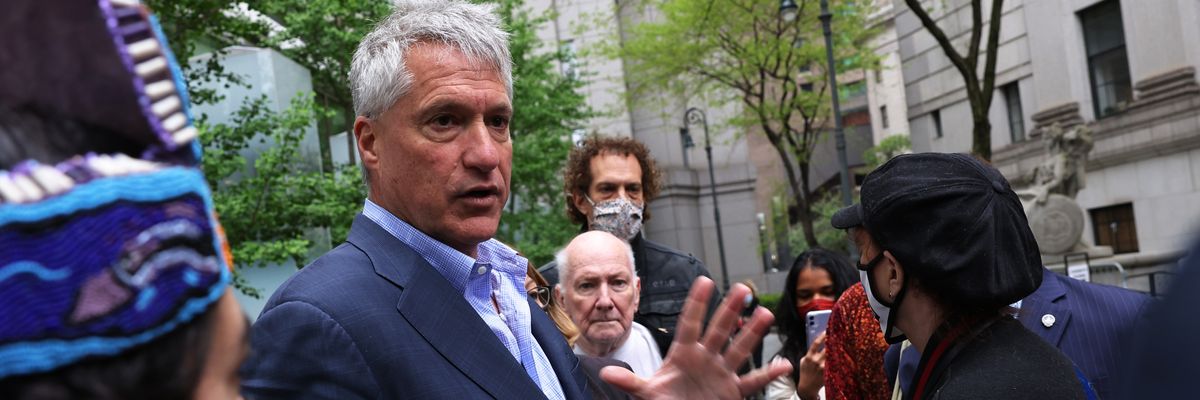After exhausting his options in the judicial system, American attorney Steven Donziger on Wednesday launched a campaign seeking a
pardon from U.S. President Joe Biden for his misdemeanor conviction—the result of a process that experts worldwide have condemned as retaliatory for his climate justice work and an abuse of the nation's judiciary.
"No matter where one stands on the political spectrum, we should all be able to agree that what happened to me in the United States should not happen to anybody in any country that adheres to the rule of law," Donziger
said in a statement announcing a letter to Biden signed by 14 prominent lawyers and a leader at the advocacy group Amazon Watch.
"Corporations should not be allowed to take direct control of a public prosecution from the government and lock up their critics, as happened to me," asserted Donziger, who spent 993 days in
federal prison and on house arrest. "It's an outrageous abuse of power that not only wrecked me and my family's life for three years but also embarrassed our country in the eyes of the world."
"As far as we can tell, this was the nation's first private corporate prosecution and is an obvious violation of the rule of law."
Donziger is a Harvard Law School graduate known globally for representing farmers and Indigenous people in a lawsuit targeting Chevron for polluting communities in Ecuador that resulted in a $9.5 billion judgment against the oil giant. After nearly two decades of battling the attorney in Ecuadorian courts, the company went after him directly in U.S. federal court.
The attorneys backing his pardon request detailed in their letter how Donziger endured a "patently biased prosecution by a group of three Chevron-linked lawyers" for refusing to comply with an order from a U.S. judge—an ex-corporate attorney with
investments in the oil giant—to turn over his electronics and client communications to the company.
"As far as we can tell, this was the nation's first private corporate prosecution and is an obvious violation of the rule of law," they wrote to Biden. "As a result of the private prosecution, Mr. Donziger, a resident of New York City, spent close to three years in detention at home and in prison even though the maximum sentence under the law for his misdemeanor offense level was 180 days."
"A pardon would bring a measure of justice to a prosecution that has been widely criticized as a violation of international law by respected international and U.S.-based jurists, and as a grave threat to free speech by a multitude of political leaders and over 120 respected civil society organizations including Amnesty International, Global Witness, and Greenpeace," the lawyers argued.
Critics of the process that resulted in his conviction include the
United Nations Working Group on Arbitrary Detention; a team of international trial observers led by Stephen A. Rapp, U.S. ambassador for war crimes under the Obama administration; Judge Steven Menashi, appointed to U.S. Court of Appeals for the 2nd Circuit by former President Donald Trump; and right-wing U.S. Supreme Court Justices Neil Gorsuch and Brett Kavanaugh, who dissented from a decision not to take his case.
"I am inspired by Steven's courage, resilience, and determination," said Paul Paz y Miño of Amazon Watch, who signed the 12-page letter along with the group of attorneys. "That's why Chevron wants to destroy him. Steven's very existence creates enormous financial risk to Chevron and to the oil industry generally. Every fossil fuel industry lawyer in this country fears Steven."
"More broadly, Chevron's outrageous abuse of power and manipulation of the federal judiciary to target Steven should deeply concern every advocate in the country, particularly those who engage in protest," Paz y Miño warned. "What happened to Steven is a central component of the fossil fuel industry's playbook to silence public opposition."
Water Protector Legal Collective director Natali Segovia, one of the lawyers who signed on, similarly condemned legal tactics used by corporations to target environmental campaigners.
"Around the world, human rights defenders like Steven Donziger are targeted and even killed for their advocacy and work on Indigenous rights and environmental justice issues," Segovia said. "Steven's case, however, is emblematic of the weaponization of the law by a powerful corporation against a human rights defender—an attorney, to be exact—and sets a dangerous precedent."
"If it could happen to Steven, a Harvard-trained human rights lawyer, it could happen to anyone on climate frontlines."
"If it could happen to Steven, a Harvard-trained human rights lawyer, it could happen to anyone on climate frontlines," Segovia stressed. "This is what we are guarding against. This is why a pardon for Steven barely hits the tip of the iceberg to reverse course, but is a necessary step in ensuring fundamental rights of due process and human rights in the United States."
The other lawyers supporting Donziger—who hail from prestigious universities and groups such as the Center for Constitutional Rights—are Nadia Ahmad, Baher Azmy, Scott Wilson Badenoch, Terrence Collingsworth, Aaron Fellmeth, Richard Friedman, Martin Garbus, Jeffrey Haas, Ronald Kuby, Jeanne Mirer, Aaron Marr Page, Nadine Strossen, and Michael Tigar.
Along with thanking "from the bottom of my heart the many distinguished lawyers who have agreed to represent me in this campaign," Donziger called on the Biden administration to investigate Chevron for abusing the U.S. legal system.
Donziger also said that it remains "critical that people focus on what is of paramount importance, which is the plight of the thousands of people in Ecuador who face a serious risk of death if Chevron does not comply with the rule of law."
